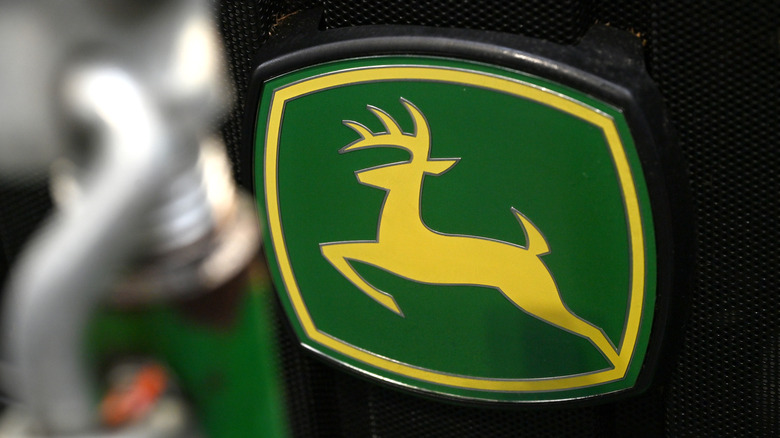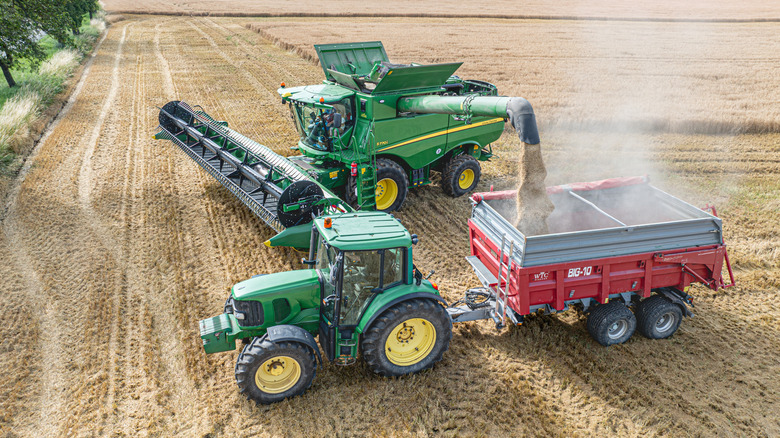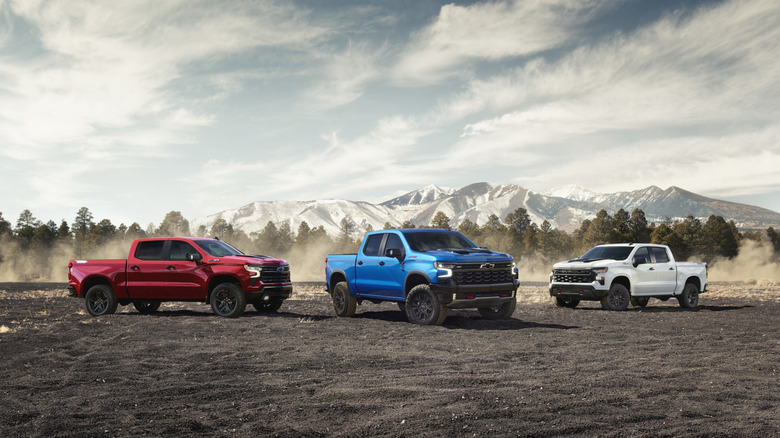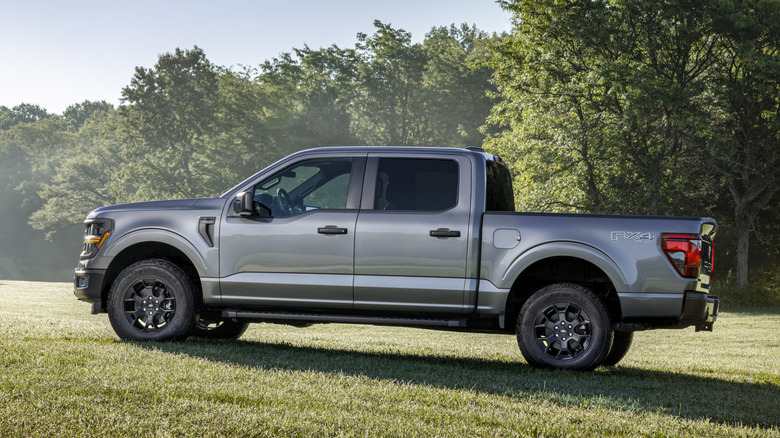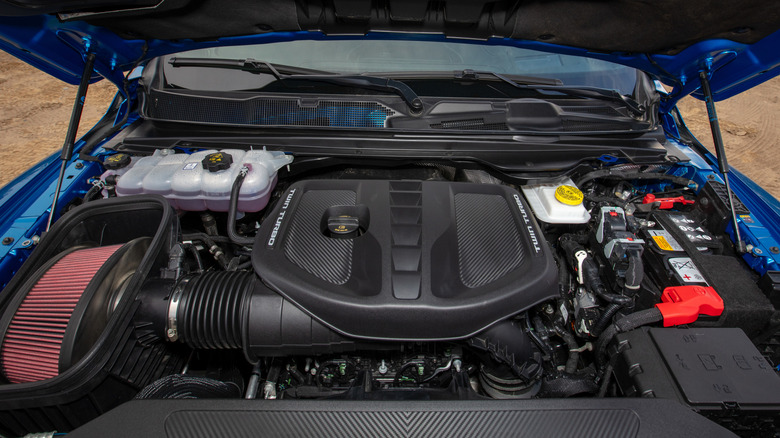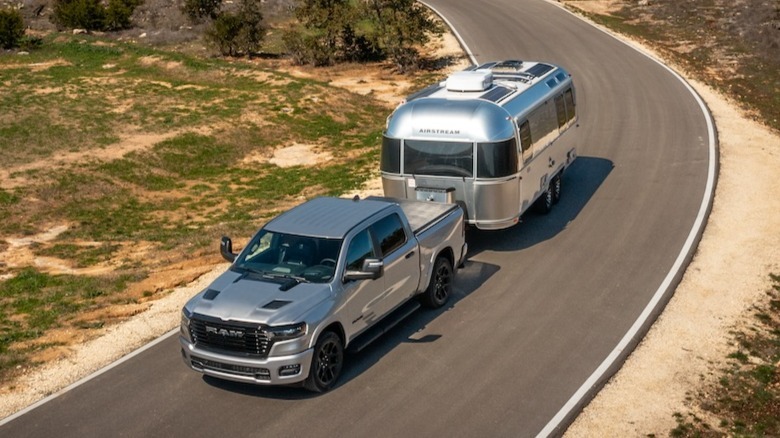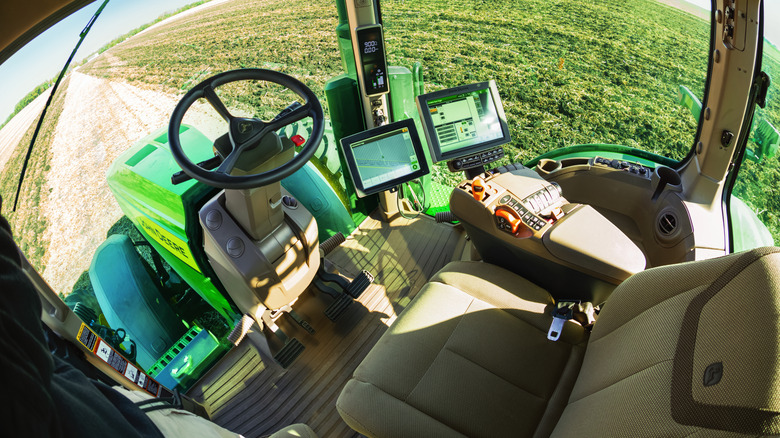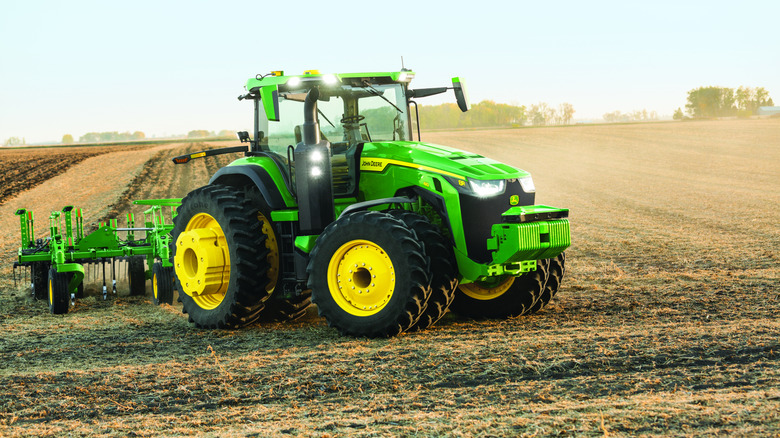How John Deere Could Make A Successful Pickup Truck For The US Market
John Deere is not only one of the most recognizable brands when it comes to tractors and agricultural equipment, it's one of the most well known brands period, up there with Coca-Cola and Nike. If you don't own a John Deere tractor, you most likely know someone who does. It's a brand that's managed to get its suite of products just about everywhere on the planet. The company makes everything from the classic green and yellow lawn tractors to giant excavators and earth moving equipment. It even has a means to sell to governmental and military entities.
Even with the menagerie of vehicles and pieces of equipment, you may notice a gap in the repertoire and that's a conventional road-going pickup truck. Now, John Deere hasn't made any plans to offer a truck and, barring a completely left field announcement, it likely won't offer one anytime soon. Plus, with the exception of Ford and International Harvester, tractor and agricultural equipment makers typically stay out of the automotive field.
But, what would it take for John Deere to not only produce and sell a pickup, but also make it successful, beating out other brands in a very competitive segment?
An unlikely proposition
Before you dive into what a John Deere pickup might look like, you need to consider why it would likely never happen. First and foremost, John Deere is not a car company. Tractors and the like have many automotive components like internal combustion engines, interiors suited for heavy use and long hours, transmissions, lights, and a lot of automotive themed parts. But the company doesn't make anything that could be given a license plate and airbags and be considered a car. Just making something pickup truck shaped would require a lot of tooling changes and augmentations to existing production facilities (or new ones) that would take enormous amounts of time, money, and manpower to implement.
Additionally, the company would have a lot of hurdles to jump through to get a truck crash tested, meet emissions standards, and meet safety mandates should it decide to produce a truck. Farm and construction equipment don't have the same legal standards when it comes to fuel efficiency and safety.
John Deere certainly has the resources to do all of the above, but it would be unrealistic to shift production capacity towards something that would essentially be a gamble. If the truck is a flash in the pan in the popularity department, then all that research and development would be for naught.
The competition
If that wasn't enough, you also have to look into the world John Deere would be diving into should it make a pickup. As of writing, in the first quarter of 2025, there are over two dozen trucks of all sizes currently offered for sale from over 10 distinct brands in the United States. That includes small hybrid utes like the Ford Maverick, electric trucks like the Rivian R1T, and huge heavy-duty Ram 3500s. It's as varied as it is competitive.
A stalwart like the Ford F-150 is not only one of the best-selling trucks, but also one of the best-selling vehicles in human history. Brands like Ford, Chevy, and Ram have been battling since time immemorial for market supremacy and trucks like the Toyota Tacoma and the Tesla Cybertruck have developed entire subcultures (for better or worse).
The competition is stiff, and John Deere would have to make something that would get enough positive attention to not only cut through several decades of marketing and historical lineups, but also persuade truck buyers to jump from brands they've trusted for years. It's not impossible, though. Rivian, a total newcomer, managed to find its own niche with high quality electric trucks, but it's certainly an uphill battle.
Size and shape
In a hypothetical (and unlikely scenario) where John Deere decides to bring a truck to market, what would that truck even look like? As of now, the least crowded segment in the United States is the area of little pickups like the Ford Maverick and Hyundai Santa Cruz, meaning that it wouldn't be as colossal an undertaking. However, John Deere likely wouldn't want to start at the bottom of the ladder. It's not a budget-oriented brand and prides itself on being the biggest, best, and well-equipped. That means it would potentially shoot for a full-size truck like the F-150, Silverado 1500, and Ram 1500.
With the exception of the Ram 1500, which has switched to a twin-turbo inline-six, both the Silverado and F-150 still have optional V8s under the hood, or at least the option for one. The John Deere truck would likely come standard with a six-cylinder of some variety and then allow for customers to opt in for a V8. John Deere could also play to its strengths and extensive experience in the diesel market and offer a diesel drivetrain.
As far as layout, there isn't a lot of diversity in the segment. A quad-cab passenger compartment with a 5-foot 7-inch or 6-foot 4-inch bed is the general shape of most full-size pickups. If John Deere wanted to play it safe, that's the layout it would pick. If it wanted to shake things up a bit, it could go with a single cab and eight-foot bed, like trucks from a few decades ago.
Power and specifications
As far as capability and specifications are concerned, the John Deere truck would have to meet or at least exceed current full-size trucks. That means a towing capacity of at least 10,000 pounds and a payload in the neighborhood of 2,250 pounds. It would have to reach those numbers just to be even remotely competitive in the scene. No one will buy a truck if its specs are worse than everything else on the market.
300 horsepower will have to be the minimum as well, with any optional drivetrains producing close to 400 or even 500 horsepower. A diesel powertrain is where it could get interesting. No one is clamoring to put a 13.6-liter diesel engine like you would find in a John Deere X9 1100 combine into a consumer level truck.
However, with some clever marketing and, of course a green and yellow paint scheme, John Deere is well within its capability to produce an in-house diesel engine with all of the John Deere badging and branding one could ask for. Additionally, diesel is better suited to higher torque outputs. John Deere would be wise to avoid chasing acceleration and top speed numbers and instead highlight how much insane torque you can achieve with a big diesel engine.
Autonomy for the farm
It's been well established that John Deere would be fighting a huge uphill battle, if it were to debut a pickup. Additionally, it likely wouldn't look that different aesthetically from other pickups on the market (albeit the Deere would have to be painted green and yellow). However, where John Deere could really innovate is on a farm. In 2025, John Deere offers a wide variety of farm equipment fitted with autonomous technology that makes farming easier. It has combines and tractors that are capable of driving themselves over the long hours of the workday, making farmer's lives easier.
John Deere could absolutely implement this technology into a pickup. Legal hurdles and the overall high speed of roads would keep the tech off the highway, but the low speed precise work of farming is where autonomy could shine. A John Deere truck wouldn't have to be all that impressive mechanically if it could act as a mobile hub of sorts from which a farmer could control the rest of the farm equipment. Imagine the time saved if a farmer didn't have to leave the cab of their truck to change the programming of entire fleet of vehicles. Plus, given the pickup's overall versatility, the control hub could do double duty as a sprayer, surveying drone launch pad, or whatever else you can fit in the bed.
Leaning into John Deere's strengths
John Deere probably isn't going to make a truck anytime soon. But if it did, it would have to lean into what keeps farmers coming back to the green and yellow fold. That is a product tailor-made for work on a farm. The truck parts wouldn't have to be that impressive if it could work well within the John Deere ecosystem and that includes the company's growing catalog of autonomous vehicles. It would be a much more attractive purchase for a farmer if they could walk into a John Deere dealership and buy every vehicle they need without ever having to darken the doorway of a car dealership.
A GPS-guided low speed autonomous pickup that acts as a control hub for a fleet of farm vehicles might not dethrone the Ford F-150 in sales and the demographics of who would actually buy one is fairly slim when it comes to volume. However, to the right customer, the truck might sell (and drive) itself.
